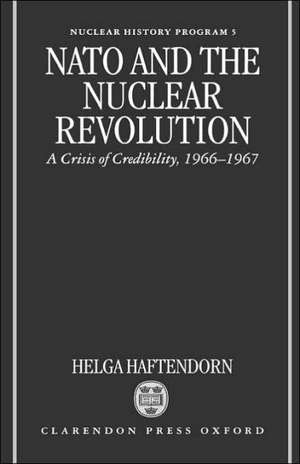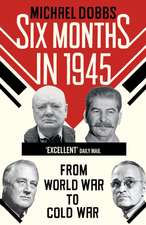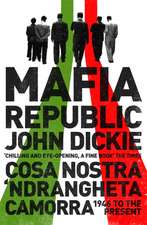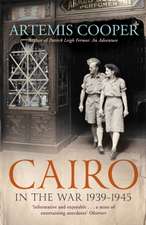NATO and the Nuclear Revolution: A Crisis of Credibility 1966-67: Nuclear History Program, cartea 5
Autor Helga Haftendornen Limba Engleză Hardback – 4 apr 1996
Preț: 1360.36 lei
Preț vechi: 2070.25 lei
-34% Nou
Puncte Express: 2041
Preț estimativ în valută:
260.30€ • 271.78$ • 215.43£
260.30€ • 271.78$ • 215.43£
Carte tipărită la comandă
Livrare economică 25-31 martie
Preluare comenzi: 021 569.72.76
Specificații
ISBN-13: 9780198280033
ISBN-10: 0198280033
Pagini: 460
Dimensiuni: 147 x 224 x 29 mm
Greutate: 0.64 kg
Ediția:New.
Editura: Clarendon Press
Colecția Clarendon Press
Seria Nuclear History Program
Locul publicării:Oxford, United Kingdom
ISBN-10: 0198280033
Pagini: 460
Dimensiuni: 147 x 224 x 29 mm
Greutate: 0.64 kg
Ediția:New.
Editura: Clarendon Press
Colecția Clarendon Press
Seria Nuclear History Program
Locul publicării:Oxford, United Kingdom
Recenzii
an impressive account of the frency of diplomatic effort which led in 1967 to a new strategy and modus vivendi which held the transatlantic alliance together until the next crisis in the early 1980s.
Publication is well-timed in the context of current discussions about the future of NATO and enlargement. Professor Haftendorn's book should be read by all those involved or interested in these discussions. Common values, coherence and clarity of purpose are central to every institution having a future - a fact which needs to be remembered today.
The book offers and intricately detailed account of two years in the life of NATO ... detailed and thoroughly researched, and, for British and American readers, the focus on German sources is refreshing. At the level of history, the book is an important contribution to the literature, and to the current debate, informed by new documentary evidence, surrounding the origins and nature of Flexible Response ... The conclusion provides summaries of the case studies that will prove helpful to those who do not require the level of detail provided in the body of the text.
Basing her research on archives mainly in the USA and Germany, on interviews, news-clipping collections and a host of secondary literature, she achieves once again the high standard of meticulous historical detective work which has already characterised her previous word on nuclear strategy ... Helga Haftendorn's book satisfies all the many expectations that one might bring to it: the historian, the political scientist, the strategist, and even the casual reader will find a lucidly written, well-structured and clearly argued book that is a major record of NATO history ... a masterpiece of scholarly work, and yet without an ounce of superfluous waffle or fat. The detail of the footnoting, the work that has gone into verifying finest details are a joy to behold for anybody who suspects that true standards of scholarship have died out with the increasing pressure for swift publication.
Publication is well-timed in the context of current discussions about the future of NATO and enlargement. Professor Haftendorn's book should be read by all those involved or interested in these discussions. Common values, coherence and clarity of purpose are central to every institution having a future - a fact which needs to be remembered today.
The book offers and intricately detailed account of two years in the life of NATO ... detailed and thoroughly researched, and, for British and American readers, the focus on German sources is refreshing. At the level of history, the book is an important contribution to the literature, and to the current debate, informed by new documentary evidence, surrounding the origins and nature of Flexible Response ... The conclusion provides summaries of the case studies that will prove helpful to those who do not require the level of detail provided in the body of the text.
Basing her research on archives mainly in the USA and Germany, on interviews, news-clipping collections and a host of secondary literature, she achieves once again the high standard of meticulous historical detective work which has already characterised her previous word on nuclear strategy ... Helga Haftendorn's book satisfies all the many expectations that one might bring to it: the historian, the political scientist, the strategist, and even the casual reader will find a lucidly written, well-structured and clearly argued book that is a major record of NATO history ... a masterpiece of scholarly work, and yet without an ounce of superfluous waffle or fat. The detail of the footnoting, the work that has gone into verifying finest details are a joy to behold for anybody who suspects that true standards of scholarship have died out with the increasing pressure for swift publication.


















